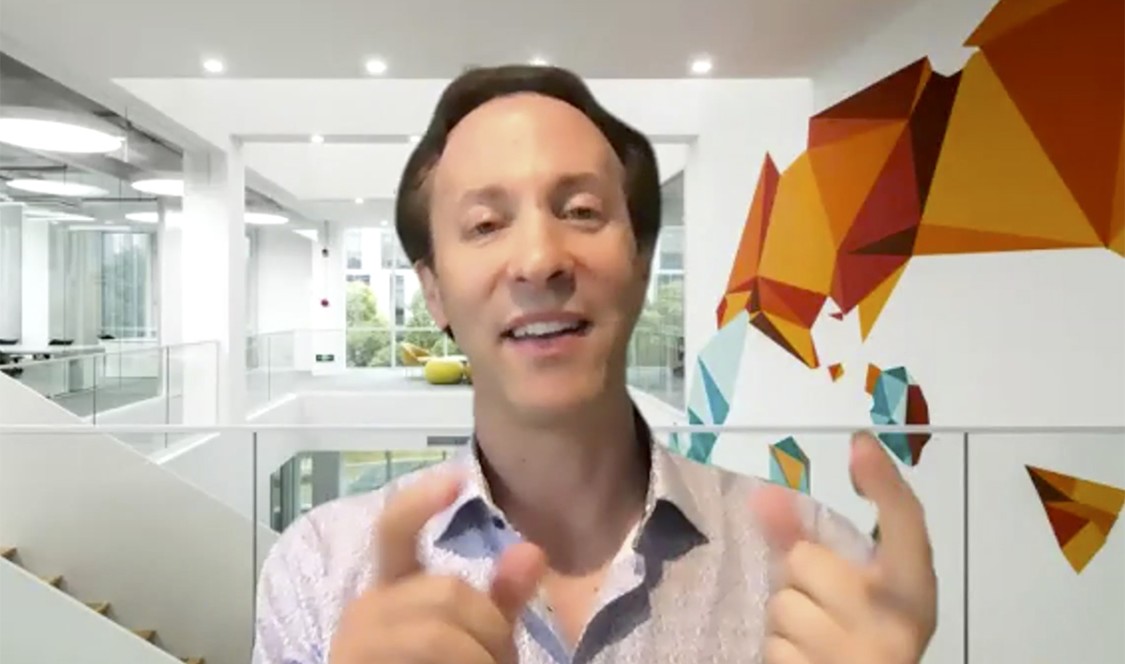How are we adapting to life during the pandemic? While many of us are experiencing brain fog, with a blurred sense of the future, David Eagleman sees a silver lining, an opportunity for our minds during lockdown.
“2020 has brought us events we’ve never before experienced in our lifetimes,” Eagleman said. “We’ve been talking about this for more than 180 days, nearly six months. How are our brains reacting and what does it all mean?”
One positive result the acclaimed neuroscientist foresees: “We are all going to become more flexible in our thinking.” This flexibility, Eagleman said, can have long-term benefits, such as fending off dementia or succeeding in what he called, “the creative economy.”
Eagleman headlined the kickoff event for the virtual Marian Miner Cook Athenaeum fall speaker series, held on Wednesday for a Zoom-based audience of students, parents, and alumni. His talk, “The Science of Lockdown: What Happens to Our Brains in Isolation?” focused on how our brains function, especially in meeting and overcoming challenges.
Eagleman teaches at Stanford, heads the Center for Science and Law, and is a writer and the host of “The Brain” the Emmy-nominated PBS series. His latest book, “Livewired: The Inside Story of the Ever-Changing Brain,” published in August.
Eagleman headlined the kickoff event for the virtual Marian Miner Cook Athenaeum fall speaker series, held on Wednesday for a Zoom-based audience of students, parents, and alumni. His talk, “The Science of Lockdown: What Happens to Our Brains in Isolation?” focused on how our brains function, especially in meeting and overcoming challenges.
Eagleman teaches at Stanford, heads the Center for Science and Law, and is a writer and the host of “The Brain” the Emmy-nominated PBS series. His latest book, “Livewired: The Inside Story of the Ever-Changing Brain,” published in August.
To lead an understanding, Eagleman first took the audience for “a peek under the hood” of how our brains work. “Your brain is always working, creating an internal model of the world,” he said. “It takes collections of signals and puts together an understanding of what’s happening that you’re not even conscious of.”
The brain, Eagleman continued, is a “prediction machine, constantly shaping the best predictions to springboard into the future.”
When the pandemic suddenly holed us all up in our homes, Eagleman said, “everything was in shambles, forcing us to examine how our internal models of the world had broken down.”
To emerge from these “shambles,” our brains need to update, requiring fresh approaches to build new internal models. “As an adult, if you take up a new skill there are visible changes in the structure of your brain. Learning new things physically changes your brain,” he said.
While we are recalibrating our daily lives during lockdown, learning new cooking skills, or transitioning to working remotely, we are increasing our brain’s plasticity.
Eagleman sees long-term benefits to our brains meeting these new challenges. “I think we are going to see a dip in dementia when this population is older because we’ve had a unique opportunity to rewrite our circuits. The best medicine for preventing dementia is seeking novelty,” he said.
Eagleman added that he finds an interesting consequence for CMC students in the area of creativity. “During the lockdown, we’ve seen a massive stoking of creativity with people creating masks with 3D printers, for example” he said. “I believe we are heading into a ‘creativity economy’ versus the informative or manufacturing economies of your parents’ or grandparents’ generations. So, I think that what you need to get from college is cognitive flexibility. To lead the next decade, and not follow the last, you’ll need to learn how to be flexible.”
Eagleman spoke for 30 minutes before taking questions submitted by members of the audience, with the Ath Fellows managing the process. Nandeeni Patel ’21 handled the influx of questions behind-the-scenes, while Chris Agard ’21 and William Frankel ’21 read the questions to Eagleman, with priority given to those submitted by CMC students. Frankel also introduced Eagleman and served as the evening’s host.
One student was curious if Eagleman had seen research about the negative effects of social isolation on the brain. “Luckily what we are experiencing right now is not extreme, it’s not like being in solitary confinement. We can still be social right now because of technologies like Zoom. If this had happened 30 years ago, can you imagine being locked down and not able to talk with people like I am right now?”
Another question posed to Eagleman: How do you see the post-pandemic world?
“Our brains will forever be changed by this,” he said. “We’ve been suddenly kicked off of our path of least resistance. And, as stress-inducing as it is, there’s some good news. We are rethinking everything. As we try to build back, we’ll have more flexible brains and an even better world than what we started with in 2020.”
To view the Fall Athenaeum schedule, visit https://www.cmc.edu/athenaeum.
- Anne Bergman

